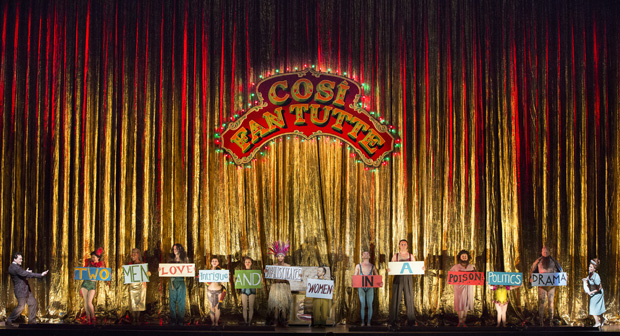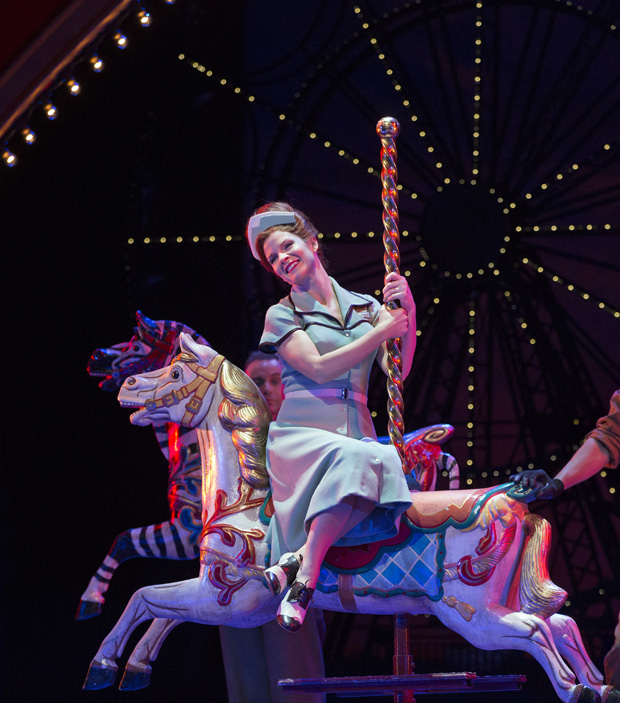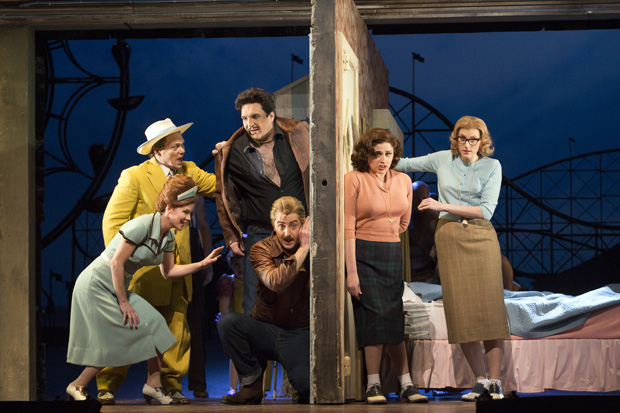Kelli O'Hara Gets Freaky in Così fan tutte
The Tony Award winner stars in a new Metropolitan Opera production of Mozart’s musical comedy.

(© Marty Sohl/The Metropolitan Opera)
The overture to the new Metropolitan Opera production of Wolfgang Amadeus Mozart’s Così fan tutte gives us a clear sense of what the following three-and-a-half hours will be like. Even before conductor David Robertson strikes up the orchestra, a man rolls a large wooden crate onstage. It has become fashionable for opera directors to stage the overture, but director Phelim McDermott may have caused the practice to jump the shark here, as an entire troupe of circus performers emerge from the box. They hold up signs reading things like "intrigue," "drama," and "please concentrate." That last one might just be this production's ironic motto: The performers spit fire and swallow swords, causing the audience to burst into applause and drown out the overture. We lose much of Robertson's sturdy and articulate interpretation, just as the rest of the score is regularly overpowered by McDermott's needlessly loud production.
It transposes librettist Lorenzo Da Ponte's story of sexual entrapment from Naples to an American amusement park circa 1950. Don Alfonso (Christopher Maltman) bets naval officers Ferrando (Ben Bliss) and Guglielmo (Adam Plachetka) that he can prove that their fiancées, Dorabella (Serena Malfi) and Fiordiligi (Amanda Majeski), are not as faithful as they assume. To do this, he has the men pretend to ship out suddenly, only to reappear as two mustachioed strangers. Alfonso enlists the women's trusty maid, Despina (Kelli O'Hara), to sell them on the idea of a fling. After all, their sailor boys are almost certainly unfaithful too. Dorabella and Fiordiligi resist, but Guglielmo and Ferrando pursue them aggressively as their new characters, threatening suicide if they don't get a kiss. Curiously, they swap girls in this endeavor, with Guglielmo chasing Dorabella and Ferrando chasing Fiordiligi. Unanticipated chemistry emerges in these new pairings, troubling and titillating all.
With its retrograde sexual politics, the 1950s seems like a smart setting for a story in which emotional blackmail is treated as high comedy and "no" doesn't necessarily mean no. We hope that this fresh backdrop will garner new revelations about the story. Unfortunately, all we get is a confusing mixture of Guys and Dolls and On the Town, with a dash of Side Show when McDermott becomes especially uninterested in the score.
That certainly seems to be the case during the duet "Ah, che tutto in un momento," which cedes the spotlight to a fire-eater, a bearded lady, and a giant snake (it's a song about how quickly things can change). Malfi and Majeski sing this, and all of their duets, with the graceful coordination of two birds flying in tight formation. Majeski especially glows in her two arias, skipping across a two-octave range and floating weightlessly through her high notes. Maltman is diabolical as Alfonso, Plachetka is appropriately chauvinistic as Guglielmo, and Bliss sings a lovely rendition of "Un'aura amorosa" that is frustratingly undermined by the choice to have him pace through it with his hands stuffed in his pockets.

(© Marty Sohl/The Metropolitan Opera)
Showing off her comic chops, O'Hara endows Despina with a pronounced swagger, besting the men in machismo with her rendition of "In uomini, in soldati." "Do you really expect men to be faithful?" she scoffs, completely unbothered by this sexual reality. In an opera that mostly features women being sad and confused, we're relieved to have Despina around, and we're glad to have an actress as fearless as O'Hara playing her. Of course, not even she can save a scene that has her inexplicably performing a two-step while dressed as a cowboy-themed justice of the peace.
At least Laura Hopkins's costumes are attractive, instantly summoning the '50s with poofy dresses and cat-eye glasses. Tom Pye's sets conjure Coney Island, the rickety track of a roller-coaster weaving upstage. A Wonder Wheel elegantly turns against a brilliant magenta sunset courtesy of lighting designer Paule Constable. Pye's set depicting the three motel rooms occupied by our principals temporarily transforms Così fan tutte into a door-slamming farce, and in this McDermott comes the closest to reconciling his vision with the source material, which was always funny and attention-grabbing without the need for extra directorial help.
In his cloying need to entertain, however, McDermott betrays how bored he is by this opera — and consequently, so are we. This shouldn't the case: There's huge potential in staging an opera with a title meaning "All women are like that" in this age of #YesAllWomen. Sadly, McDermott misses this main event for the sideshow, and we miss an opportunity to connect with an opera that has been simultaneously offending and delighting audiences for the last two centuries.

(© Marty Sohl/The Metropolitan Opera)








